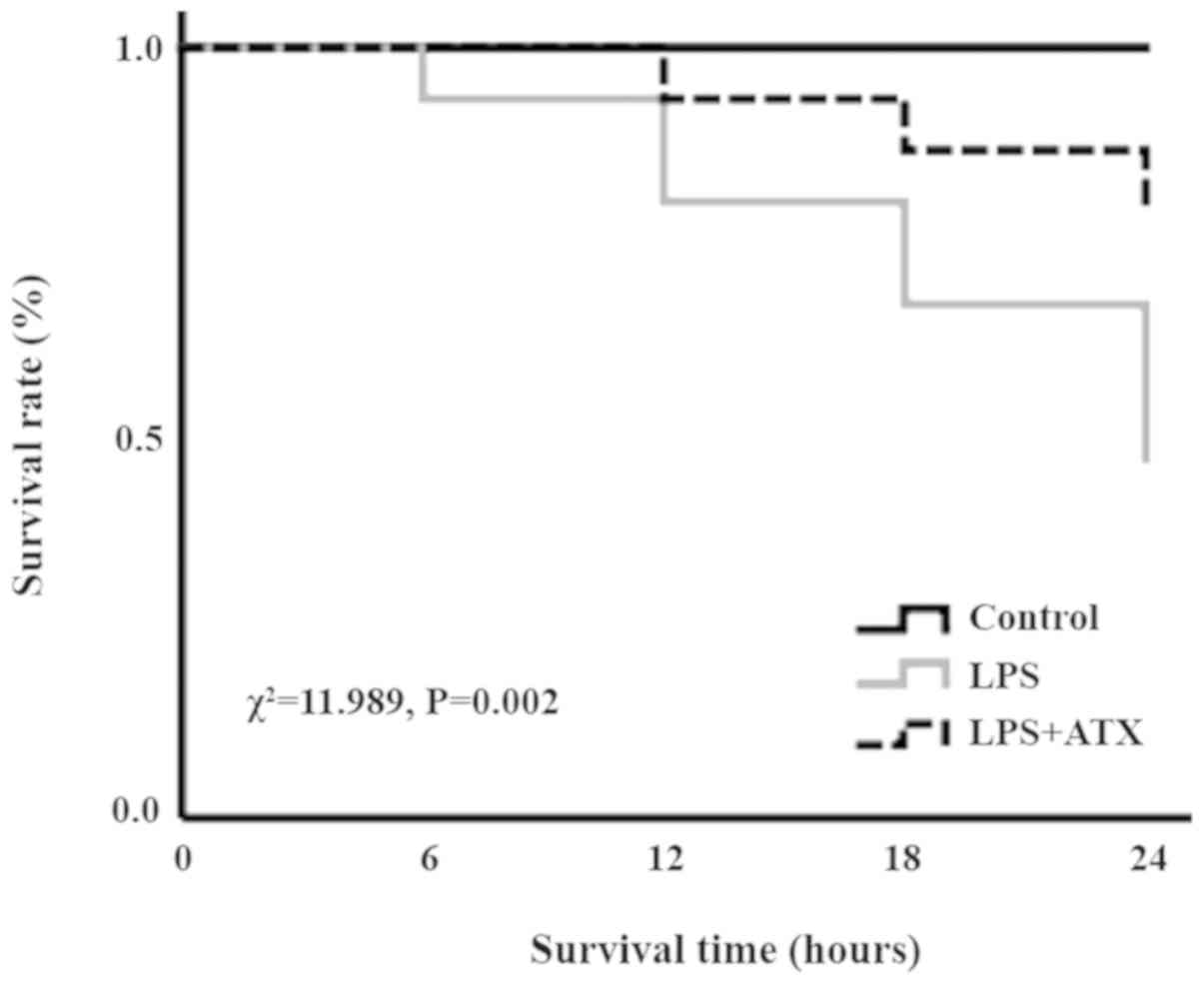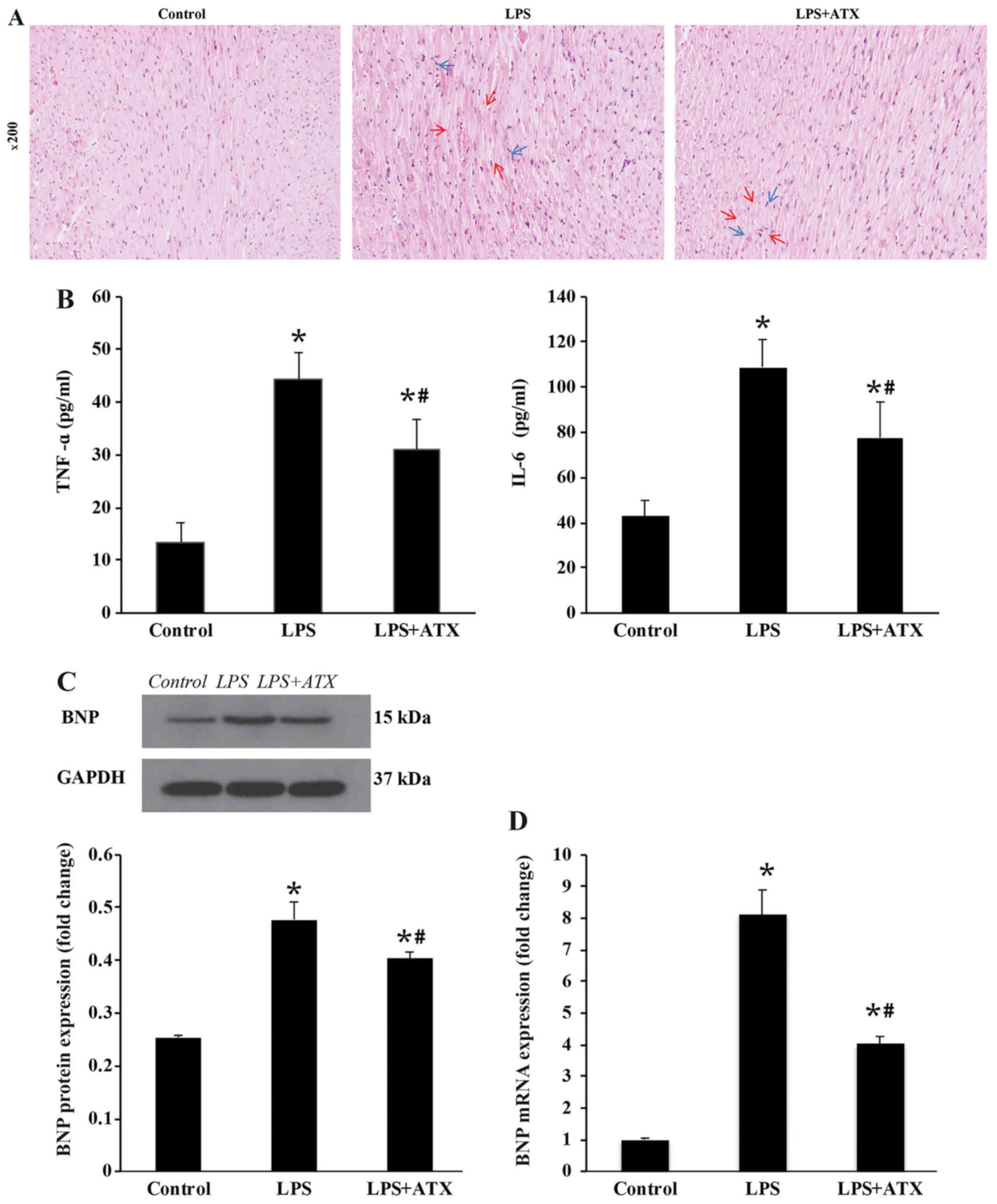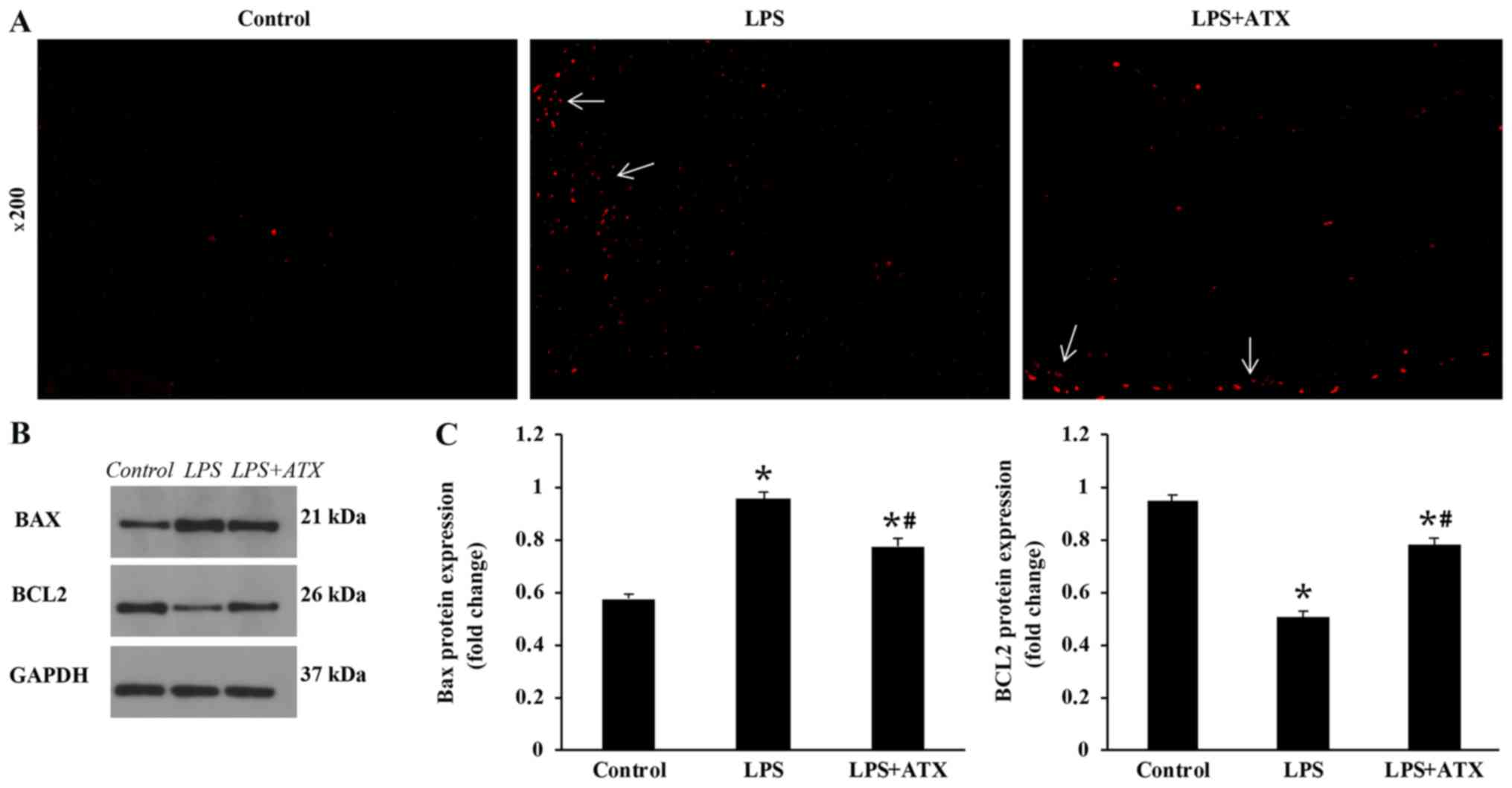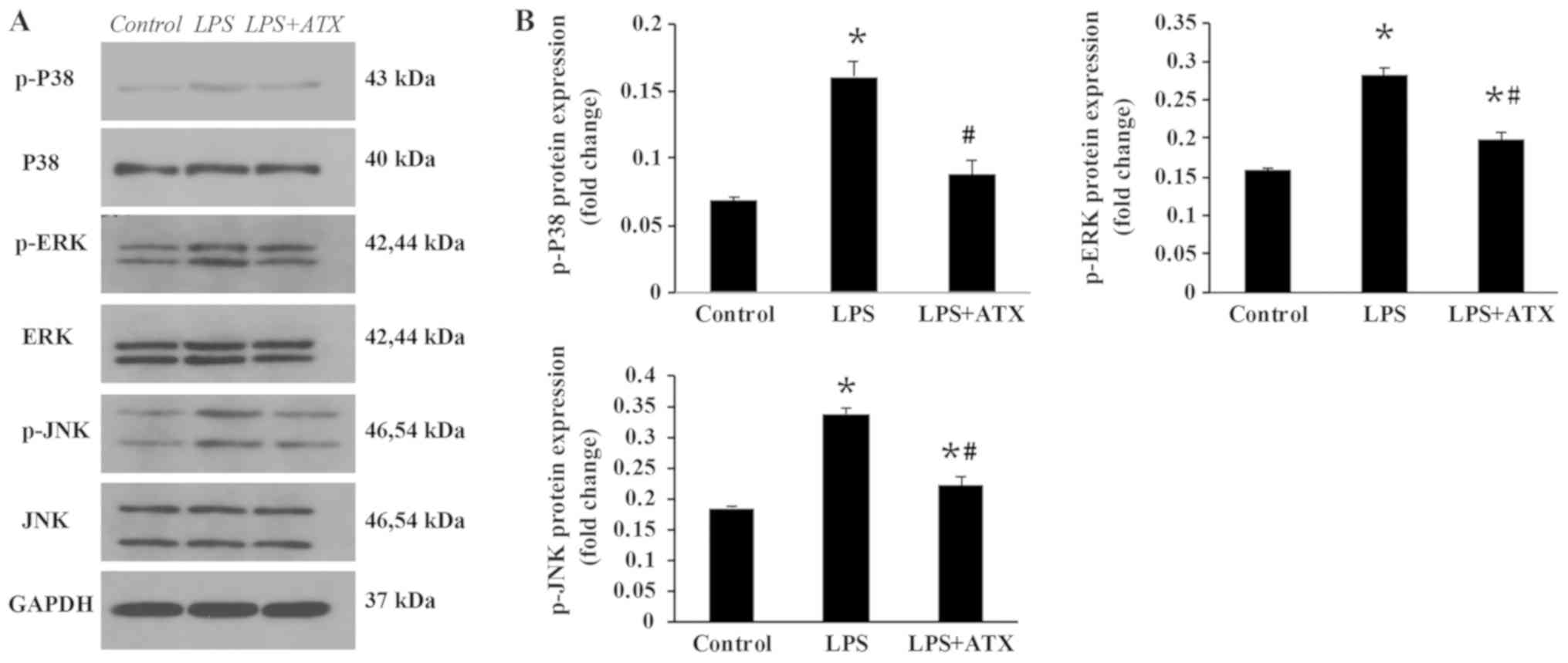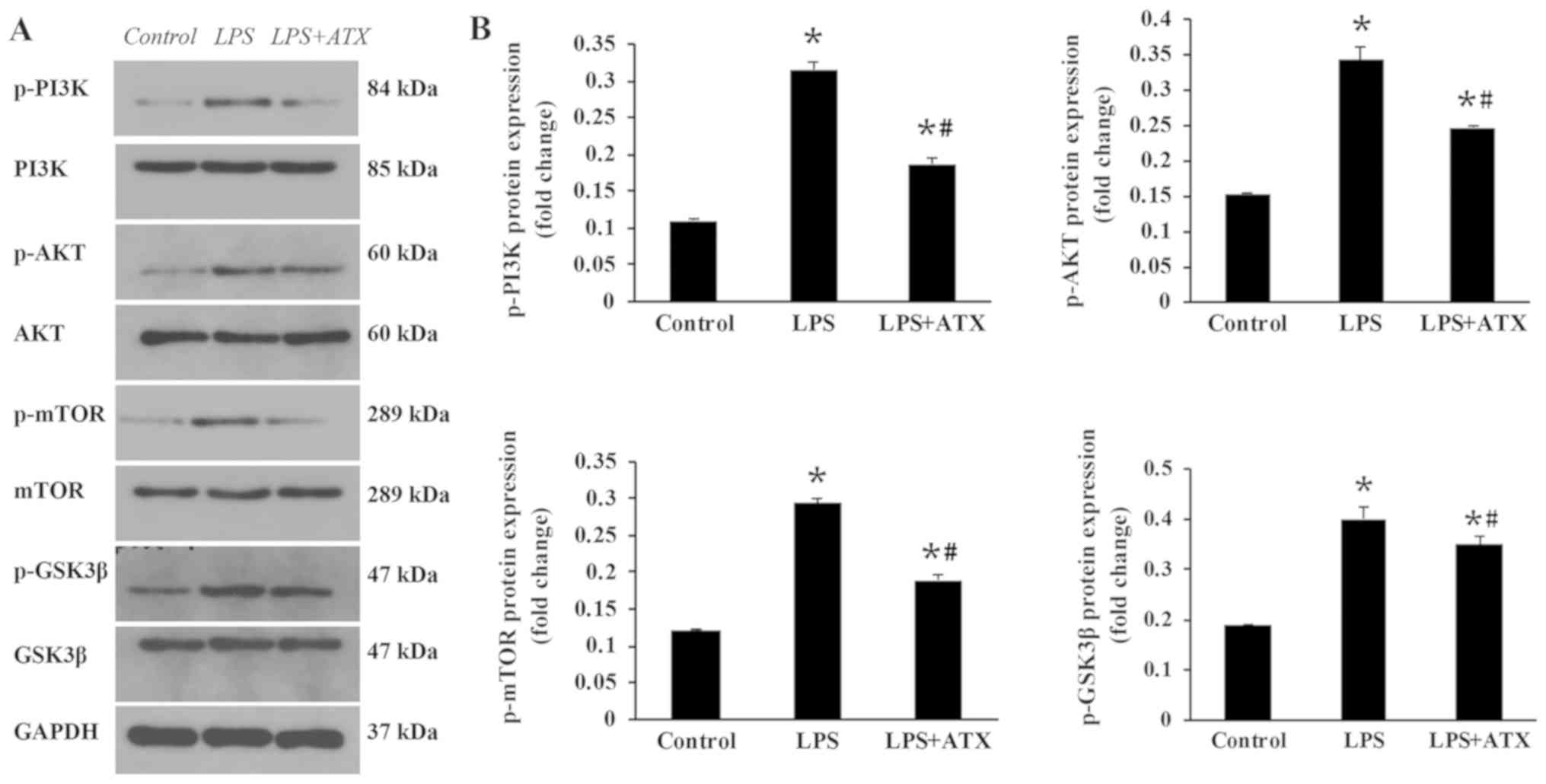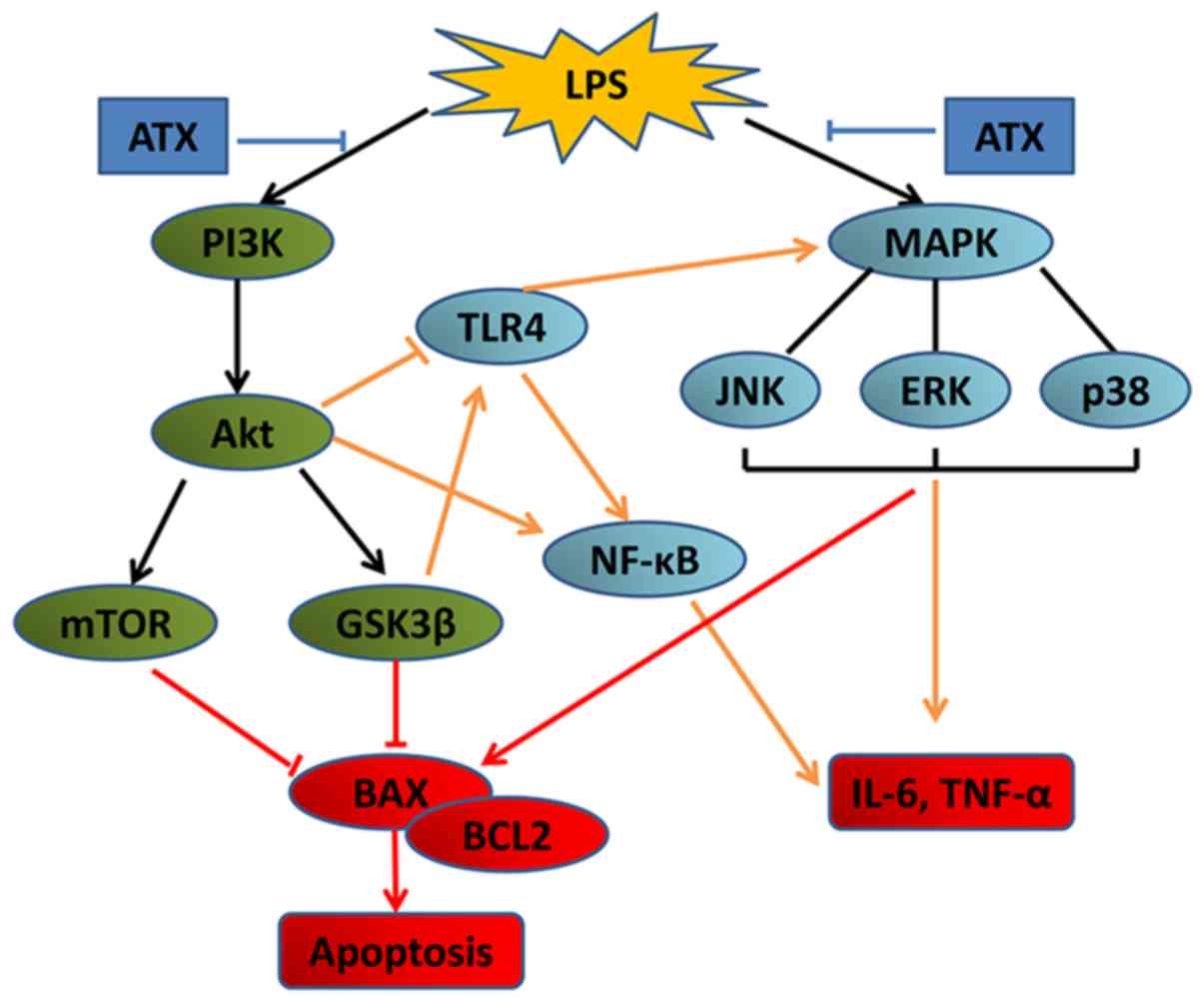|
1
|
Singer M, Deutschman CS, Seymour CW,
Shankar-Hari M, Annane D, Bauer M, Bellomo R, Bernard GR, Chiche
JD, Coopersmith CM, et al: The third international consensus
definitions for sepsis and septic shock (sepsis-3). JAMA.
315:3338–810. 2016. View Article : Google Scholar
|
|
2
|
Merx MW and Weber C: Sepsis and the heart.
Circulation. 116:793–802. 2007. View Article : Google Scholar : PubMed/NCBI
|
|
3
|
Matsuda N and Hattori Y: Systemic
inflammatory response syndrome (SIRS): Molecular pathophysiology
and gene therapy. J Pharmacol Sci. 101:189–198. 2006. View Article : Google Scholar : PubMed/NCBI
|
|
4
|
Siti HN, Kamisah Y and Kamsiah J: The role
of oxidative stress, antioxidants and vascular inflammation in
cardiovascular disease (a review). Vascul Pharmacol. 71:40–56.
2015. View Article : Google Scholar : PubMed/NCBI
|
|
5
|
Hussein G, Nakamura M, Zhao Q, Iguchi T,
Goto H, Sankawa U and Watanabe H: Antihypertensive and
neuroprotective effects of astaxanthin in experimental animals.
Biol Pharm Bull. 28:47–52. 2005. View Article : Google Scholar : PubMed/NCBI
|
|
6
|
Wu H, Niu H, Shao A, Wu C, Dixon BJ, Zhang
J, Yang S and Wang Y: Astaxanthin as a potential neuroprotective
agent for neurological diseases. Mar Drugs. 13:5750–5766. 2015.
View Article : Google Scholar : PubMed/NCBI
|
|
7
|
Fassett RG and Coombes JS: Astaxanthin: A
potential therapeutic agent in cardiovascular disease. Mar Drugs.
9:447–465. 2011. View Article : Google Scholar : PubMed/NCBI
|
|
8
|
Zhou L, Gao M, Xiao Z, Zhang J, Li X and
Wang A: Protective effect of astaxanthin against multiple organ
injury in a rat model of sepsis. J Surg Res. 195:559–567. 2015.
View Article : Google Scholar : PubMed/NCBI
|
|
9
|
Kandel ES and Hay N: The regulation and
activities of the multifunctional serine/threonine kinase Akt/PKB.
Exp Cell Res. 253:210–229. 1999. View Article : Google Scholar : PubMed/NCBI
|
|
10
|
Chen L, Liu P, Feng X and Ma C:
Salidroside suppressing LPS-induced myocardial injury by inhibiting
ROS-mediated PI3K/Akt/mTOR pathway in vitro and in vivo. J Cell Mol
Med. 21:3178–3189. 2017. View Article : Google Scholar : PubMed/NCBI
|
|
11
|
Joh EH, Gu W and Kim DH: Echinocystic acid
ameliorates lung inflammation in mice and alveolar macrophages by
inhibiting the binding of LPS to TLR4 in NF-κB and MAPK pathways.
Biochem Pharmacol. 84:331–340. 2012. View Article : Google Scholar : PubMed/NCBI
|
|
12
|
Frazier WJ, Wang X, Wancket LM, Li XA,
Meng X, Nelin LD, Cato AC and Liu Y: Increased inflammation,
impaired bacterial clearance, and metabolic disruption after
gram-negative sepsis in Mkp-1-deficient mice. J Immunol.
183:7411–7419. 2009. View Article : Google Scholar : PubMed/NCBI
|
|
13
|
Wang X, Meng X, Kuhlman JR, Nelin LD,
Nicol KK, English BK and Liu Y: Knockout of Mkp-1 enhances the host
inflammatory responses to gram-positive bacteria. J Immunol.
178:5312–5320. 2007. View Article : Google Scholar : PubMed/NCBI
|
|
14
|
Lee SJ, Bai SK, Lee KS, Namkoong S, Na HJ,
Ha KS, Han JA, Yim SV, Chang K, Kwon YG, et al: Astaxanthin
inhibits nitric oxide production and inflammatory gene expression
by suppressing I(kappa)B kinase-dependent NF-kappaB activation. Mol
Cells. 16:97–105. 2003.PubMed/NCBI
|
|
15
|
Livak KJ and Schmittgen TD: Analysis of
relative gene expression data using real-time quantitative PCR and
the 2(-Delta Delta C(T)) method. Methods. 25:402–408. 2001.
View Article : Google Scholar : PubMed/NCBI
|
|
16
|
Kakihana Y, Ito T, Nakahara M, Yamaguchi K
and Yasuda T: Sepsis-induced myocardial dysfunction:
Pathophysiology and management. J Intensive Care. 4:222016.
View Article : Google Scholar : PubMed/NCBI
|
|
17
|
Balija TM and Lowry SF: Lipopolysaccharide
and sepsis-associated myocardial dysfunction. Curr Opin Infect Dis.
24:248–253. 2011. View Article : Google Scholar : PubMed/NCBI
|
|
18
|
Honda T, He Q, Wang F and Redington AN:
Acute and chronic remote ischemic conditioning attenuate septic
cardiomyopathy, improve cardiac output, protect systemic organs,
and improve mortality in a lipopolysaccharide-induced sepsis model.
Basic Res Cardiol. 114:152019. View Article : Google Scholar : PubMed/NCBI
|
|
19
|
de Pádua Lúcio K, Rabelo ACS, Araújo CM,
Brandão GC, de Souza GHB, da Silva RG, de Souza DMS, Talvani A,
Bezerra FS, Calsavara AJC and Costa DC: Anti-inflammatory and
antioxidant properties of black mulberry (Morus nigra L.) in a
model of LPS-induced sepsis. Oxid Med Cell Longev.
2018:50480312018. View Article : Google Scholar : PubMed/NCBI
|
|
20
|
Kawaguchi S, Okada M, Ijiri E, Koga D,
Watanabe T, Hayashi K, Kashiwagi Y, Fujita S and Hasebe N:
β3-Adrenergic receptor blockade reduces mortality in
endotoxin-induced heart failure by suppressing induced nitric oxide
synthase and saving cardiac metabolism. Am J Physiol Heart Circ
Physiol. 318:H283–H294. 2020. View Article : Google Scholar : PubMed/NCBI
|
|
21
|
Kumari A, Dash D and Singh R: Curcumin
inhibits lipopolysaccharide (LPS)-induced endotoxemia and airway
inflammation through modulation of sequential release of
inflammatory mediators (TNF-α and TGF-β1) in murine model.
Inflammopharmacology. 25:329–341. 2017. View Article : Google Scholar : PubMed/NCBI
|
|
22
|
Romero-Bermejo FJ, Ruiz-Bailen M,
Gil-Cebrian J and Huertos-Ranchal MJ: Sepsis-induced
cardiomyopathy. Curr Cardiol Rev. 7:163–183. 2011. View Article : Google Scholar : PubMed/NCBI
|
|
23
|
Kapadia S, Lee J, Torre-Amione G, Birdsall
HH, Ma TS and Mann DL: Tumor necrosis factor-alpha gene and protein
expression in adult feline myocardium after endotoxin
administration. J Clin Invest. 96:1042–1052. 1995. View Article : Google Scholar : PubMed/NCBI
|
|
24
|
Haudek SB, Bryant DD and Giroir BP:
Differential regulation of myocardial NF kappa B following acute or
chronic TNF-alpha exposure. J Mol Cell Cardiol. 33:1263–1271. 2001.
View Article : Google Scholar : PubMed/NCBI
|
|
25
|
Meldrum DR: Tumor necrosis factor in the
heart. Am J Physiol. 274:R577–R595. 1998.PubMed/NCBI
|
|
26
|
Carlson DL, Willis MS, White DJ, Horton JW
and Giroir BP: Tumor necrosis factor-alpha-induced caspase
activation mediates endotoxin-related cardiac dysfunction. Crit
Care Med. 33:1021–1028. 2005. View Article : Google Scholar : PubMed/NCBI
|
|
27
|
Zhang H, Wang HY, Bassel-Duby R, Maass DL,
Johnston WE, Horton JW and Tao W: Role of interleukin-6 in cardiac
inflammation and dysfunction after burn complicated by sepsis. Am J
Physiol Heart Circ Physiol. 292:H2408–H2416. 2007. View Article : Google Scholar : PubMed/NCBI
|
|
28
|
Nick JA, Young SK, Arndt PG, Lieber JG,
Suratt BT, Poch KR, Avdi NJ, Malcolm KC, Taube C, Henson PM and
Worthen GS: Selective suppression of neutrophil accumulation in
ongoing pulmonary inflammation by systemic inhibition of p38
mitogen-activated protein kinase. J Immunol. 169:5260–5269. 2002.
View Article : Google Scholar : PubMed/NCBI
|
|
29
|
Frazier WJ, Xue J, Luce WA and Liu Y: MAPK
signaling drives inflammation in LPS-stimulated cardiomyocytes: The
route of crosstalk to G-protein-coupled receptors. PLoS One.
7:e500712012. View Article : Google Scholar : PubMed/NCBI
|
|
30
|
Li ST, Dai Q, Zhang SX, Liu YJ, Yu QQ, Tan
F, Lu SH, Wang Q, Chen JW, Huang HQ and Li M: Ulinastatin
attenuates LPS-induced inflammation in mouse macrophage RAW264.7
cells by inhibiting the JNK/NF-κB signaling pathway and activating
the PI3K/Akt/Nrf2 pathway. Acta Pharmacol Sin. 39:1294–1304. 2018.
View Article : Google Scholar : PubMed/NCBI
|
|
31
|
Ghonime MG, Shamaa OR, Das S, Eldomany RA,
Fernandes-Alnemri T, Alnemri ES, Gavrilin MA and Wewers MD:
Inflammasome priming by lipopolysaccharide is dependent upon ERK
signaling and proteasome function. J Immunol. 192:3881–3888. 2014.
View Article : Google Scholar : PubMed/NCBI
|
|
32
|
Mehta VB, Hart J and Wewers MD:
ATP-stimulated Release of interleukin (IL)-1beta and IL-18 requires
priming by lipopolysaccharide and is independent of caspase-1
cleavage. J Biol Chem. 276:3820–3826. 2001. View Article : Google Scholar : PubMed/NCBI
|
|
33
|
Stark AK, Sriskantharajah S, Hessel EM and
Okkenhaug K: PI3K inhibitors in inflammation, autoimmunity and
cancer. Curr Opin Pharmacol. 23:82–91. 2015. View Article : Google Scholar : PubMed/NCBI
|
|
34
|
Jope RS, Cheng Y, Lowell JA, Worthen RJ,
Sitbon YH and Beurel E: Stressed and inflamed, can gsk3 be blamed?
Trends Biochem Sci. 42:180–192. 2017. View Article : Google Scholar : PubMed/NCBI
|
|
35
|
Liu C, Tang X, Zhang W, Li G, Chen Y, Guo
A and Hu C: 6-bromoindirubin-3′-oxime suppresses LPS-induced
inflammation via inhibition of the TLR4/NF-κB and TLR4/MAPK
signaling pathways. Inflammation. 42:2192–2204. 2019. View Article : Google Scholar : PubMed/NCBI
|
|
36
|
Park J, Ha SH, Abekura F, Lim H, Magae J,
Ha KT, Chung TW, Chang YC, Lee YC, Chung E, et al:
4-O-carboxymethylascochlorin inhibits expression levels of on
inflammation-related cytokines and matrix metalloproteinase-9
through NF-κB/MAPK/TLR4 signaling pathway in LPS-activated RAW264.7
cells. Front Pharmacol. 10:3042019. View Article : Google Scholar : PubMed/NCBI
|
|
37
|
Kumar D, Shankar S and Srivastava RK:
Rottlerin induces autophagy and apoptosis in prostate cancer stem
cells via PI3K/Akt/mTOR signaling pathway. Cancer Lett.
343:179–189. 2014. View Article : Google Scholar : PubMed/NCBI
|
|
38
|
Guo B, Zhang W, Xu S, Lou J, Wang S and
Men X: GSK-3β mediates dexamethasone-induced pancreatic β cell
apoptosis. Life Sci. 144:1–7. 2016. View Article : Google Scholar : PubMed/NCBI
|
|
39
|
Putcha GV, Le S, Frank S, Besirli CG,
Clark K, Chu B, Alix S, Youle RJ, Lamarche A, Maroney AC and
Johnson EM Jr: JNK-mediated BIM phosphorylation potentiates
BAX-dependent apoptosis. Neuron. 38:899–914. 2003. View Article : Google Scholar : PubMed/NCBI
|
|
40
|
Lu Z and Xu S: ERK1/2 MAP kinases in cell
survival and apoptosis. IUBMB Life. 58:621–631. 2006. View Article : Google Scholar : PubMed/NCBI
|
|
41
|
Shao Z, Bhattacharya K, Hsich E, Park L,
Walters B, Germann U, Wang YM, Kyriakis J, Mohanlal R, Kuida K, et
al: c-jun N-terminal kinases mediate reactivation of Akt and
cardiomyocyte survival after hypoxic injury in vitro and in vivo.
Circ Res. 98:111–118. 2005. View Article : Google Scholar : PubMed/NCBI
|
|
42
|
Chaanine AH, Jeong D, Liang L, Chemaly ER,
Fish K, Gordon RE and Hajjar RJ: JNK modulates FOXO3a for the
expression of the mitochondrial death and mitophagy marker BNIP3 in
pathological hypertrophy and in heart failure. Cell Death Dis.
3:2652012. View Article : Google Scholar : PubMed/NCBI
|
|
43
|
Fink MP: Animal models of sepsis.
Virulence. 5:143–153. 2014. View Article : Google Scholar : PubMed/NCBI
|
|
44
|
Hubbard WJ, Choudhry M, Schwacha MG, Kerby
JD, Rue LW III, Bland KI and Chaudry IH: Cecal ligation and
puncture. Shock. 24 (Supp 1):S52–S57. 2005. View Article : Google Scholar
|
|
45
|
Wang X, Su L, Yang R, Zhang H and Liu D:
Myocardial strain/stress changes identified by echocardiography may
reveal early sepsis-induced myocardial dysfunction. J Int Med Res.
46:1439–1454. 2018. View Article : Google Scholar : PubMed/NCBI
|
|
46
|
Dejager L, Pinheiro I, Dejonckheere E and
Libert C: Cecal ligation and puncture: The gold standard model for
polymicrobial sepsis? Trends Microbiol. 19:198–208. 2011.
View Article : Google Scholar : PubMed/NCBI
|
|
47
|
Diao X and Sun S: PMicroRNA-124a regulates
LPS-induced septic cardiac dysfunction by targeting STX2.
Biotechnol Lett. 39:1335–1342. 2017. View Article : Google Scholar : PubMed/NCBI
|
|
48
|
Guo SX, Zhou HL, Huang CL, You CG, Fang Q,
Wu P, Wang XG and Han CM: Astaxanthin attenuates early acute kidney
injury following severe burns in rats by ameliorating oxidative
stress and mitochondrial-related apoptosis. Marine Drugs.
13:2105–2123. 2015. View Article : Google Scholar : PubMed/NCBI
|
|
49
|
Kakoullis L, Giannopoulou E,
Papachristodoulou E, Pantzaris ND, Karamouzos V, Kounis NG, Koniari
I and Velissaris D: The utility of brain natriuretic peptides in
septic shock as markers for mortality and cardiac dysfunction: A
systematic review. Int J Clin Pract. 73:e133742019. View Article : Google Scholar : PubMed/NCBI
|















